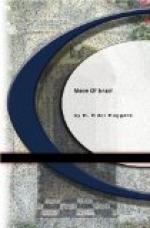“Only this, O Prince. This man saw me with my father giving him food, for he was weak and overcome with the toil of digging the mud in the heat of the sun, he who being a noble of our people knew nothing of such labour from his youth. In my presence Khuaka asked my father if now he would give me to him. My father answered that sooner would he see me kissed by snakes and devoured by crocodiles. ‘I hear you,’ answered Khuaka. ’Learn, now, slave Nathan, before to-morrow’s sun arises, you shall be kissed by swords and devoured by crocodiles or jackals.’ ’So be it,’ said my father, ’but learn, O Khuaka, that if so, it is revealed to me who am a priest and a prophet of Jahveh, that before to-morrow’s sun you also shall be kissed by swords and of the rest we will talk at the foot of Jahveh’s throne.’
“Afterwards, as you know, Prince, the overseer flogged my father as I heard Khuaka order him to do if he lagged through weariness, and then Khuaka killed him because my father in his madness struck the overseer with a mattock. I have no more to say, save that I pray that I may be sent back to my own people there to mourn my father according to our custom.”
“To whom would you be sent? Your mother?”
“Nay, O Prince, my mother, a lady of Syria, is dead. I will go to my uncle, Jabez the Levite.”
“Stand aside,” said Seti. “The matter shall be seen to later. Appear, O Ana the Scribe. Swear the oath and tell us what you have seen of this man’s death, since two witnesses are needful.”
So I swore and repeated all this story that I have written down.
“Now, Khuaka,” said the Prince when I had finished, “have you aught to say?”
“Only this, O Royal One,” answered the captain throwing himself upon his knees, “that I struck you by accident, not knowing that the person of your Highness was hidden in that long cloak. For this deed it is true that I am worthy of death, but I pray you to pardon me because I knew not what I did. The rest is nothing, since I only slew a mutinous slave of the Israelites, as such are slain every day.”
“Tell me, O Khuaka, who are being tried for this man’s death and not for the striking of one of royal blood by chance, under which law it is lawful for you to kill an Israelite without trial before the appointed officers of Pharaoh.”
“I am not learned. I do not know the law, O Prince. All that this woman said is false.”
“At least it is not false that yonder man lies dead and that you slew him, as you yourself admit. Learn now, and let all Egypt learn, that even an Israelite may not be murdered for no offence save that of weariness and of paying back unearned blow with blow. Your blood shall answer for his blood. Soldiers! Strike off his head.”
The Nubians leapt upon him, and when I looked again Khuaka’s headless corpse lay by the corpse of the Hebrew Nathan and their blood was mingled upon the steps of the temple.




